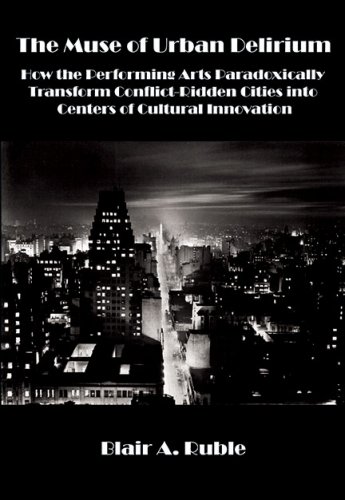
About the Author
Blair A. Ruble is currently Vice President for Programs at the Wilson Center, and Director of the Center’s Urban Sustainability Laboratory. Previously he served as long-time Director of the Kennan Institute for Advanced Russian Studies (1989-2012). A native of New York, Dr. Ruble worked previously at the Social Science Research Council in New York City, as well as at the National Council for Soviet and East European Research in Washington.
Dr. Ruble received his MA and PhD degrees in Political Science from the University of Toronto. He is the author of six monographic studies and twenty edited works, as well as numerous articles in the opinion pages of major newspapers. His latest work—Washington’s U Street: A Biography (Johns Hopkins University Press, 2010)—explores the tentative mixing of classes in one of the Nation Capital’s most important neighborhoods.
THE MUSE OF URBAN DELIRIUM: How the Performing Arts Paradoxically Transform Conflict-Ridden Cities into Centers of Cultural Innovation
Blair A. RubleNew Academia Publishing, 2017
664 Pages, 43 photos
ISBN 978-0-9974962-9-1 Paperback
For BULK ORDERS, order directly from New Academia Publishing.
Queries: orders@newacademia.com
About the Author
Blair A. Ruble is currently Vice President for Programs at the Wilson Center, and Director of the Center’s Urban Sustainability Laboratory. Previously he served as long-time Director of the Kennan Institute for Advanced Russian Studies (1989-2012). A native of New York, Dr. Ruble worked previously at the Social Science Research Council in New York City, as well as at the National Council for Soviet and East European Research in Washington.
Dr. Ruble received his MA and PhD degrees in Political Science from the University of Toronto. He is the author of six monographic studies and twenty edited works, as well as numerous articles in the opinion pages of major newspapers. His latest work—Washington’s U Street: A Biography (Johns Hopkins University Press, 2010)—explores the tentative mixing of classes in one of the Nation Capital’s most important neighborhoods.
About the book
This collection of essays seeks answers to the challenges of urban diversity, conflict, and creativity by examining the emergence of musical and theatrical originality in a series of specific cities at particular times. It does so by using various performing arts – opera, dance, theater, music – as windows onto the creativity of urban life. These were urban societies in which the socio-economic and political transformations were taking place at such rapid speed as to force consideration of their meaning and identity. This volume explores the relationship between those creative minds who sought to define their communities and their urban muses rather than examining the arts that they have produced. In other words, it is a book about urban place, not about the performing arts.
Praise
“This is a fascinating exploration of how urban societies, in a broad geographic and historical range, voice who they are and simultaneously are defined by, their theatre.”
—Juli Iezzi, Professor of Theater, University of Hawaii
“A study like this requires an author to have equal expertise in the arts (music, theatre, dance), urban development, as well as history and politics—on a wide international scope. A political scientist and urbanist by training, a connoisseur of art, and a world traveler through scholarly and professional pursuits—Dr. Ruble is a multifaceted researcher, capable of synthesizing multiple artistic and scholarly fields. Through this synthesis, and due to his ability to see across many disciplines, he created a unique book that will speak to readers interested in different fields.”
—Andrei Malaev-Babel, Associate Professor of Theatre, Head of Acting, Florida State University/Asolo Conservatory for Actor Training
“These essays, woven together in an imaginative and creative fashion, are quite wonderful. Understanding the development of cities as a function of the creative and artistic energy they nurture is a fascinating concept and Blair makes it seem both sensible and startling. It is indeed a remarkable conceit, which he pulls off with grace and skill.”
—Joseph S. Tulchin, Senior Scholar, Woodrow Wilson Center





 Coming Soon
Coming Soon Awards
Awards